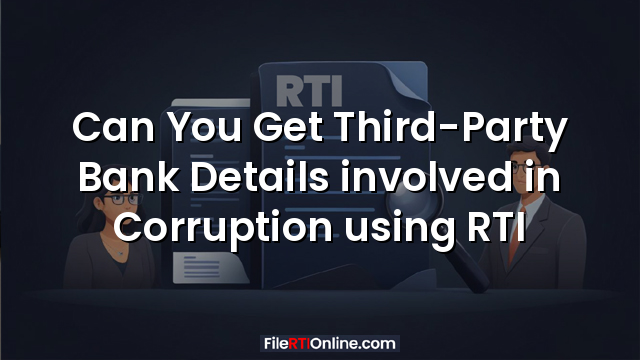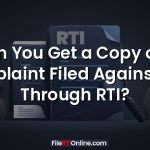How to Use RTI to Raise Corruption Issues – Can You Get Third-Party Bank Details?
The Right to Information (RTI) Act is one of the strongest tools available to citizens for exposing corruption and misuse of public funds. People often use RTI to verify irregularities in government schemes, fraudulent benefit claims, and misuse of public resources.
But many applicants get confused about the limits of RTI, especially when the information involves personal or financial details of private individuals.
A common question people ask is:
“Can I use RTI to obtain someone’s bank account details—like their savings or FD accounts—if I believe they’re committing fraud or illegally availing government benefits?”
To understand this, let’s look at a real case.
Case Example: RTI Request for Savings & FD Details of a Third Party
A citizen filed an RTI with State Bank of Bikaner & Jaipur (SBBJ) seeking:
- Savings account details
- Fixed deposit details
- Accounts held man, his wife, sons, and daughters
The applicant argued that the family was illegally listed as a BPL (Below Poverty Line) household and was fraudulently enjoying benefits. He believed that the bank records would expose corruption in BPL selection.
Bank’s Response
The Public Information Officer (PIO) refused the information citing:
- Section 8(1)(d) – Information related to commercial confidence
- Section 8(1)(e) – Information held in fiduciary relationship
- Section 8(1)(j) – Personal information causing invasion of privacy
CIC’s Decision
The Central Information Commission agreed with the bank and held:
Third-party bank account details cannot be disclosed under RTI.
Even if the applicant alleges corruption, it does not automatically mean personal financial data can be shared.
The appeal was rejected.
Why You Cannot Get Third-Party Bank Account Details Via RTI
Bank account details are considered highly personal and private. Banks hold this information under a fiduciary relationship, meaning they must protect the confidentiality of their customers.
RTI law clearly states that:
- Personal financial details cannot be disclosed without larger public interest, and
- The “public interest” must be strong enough to override the right to privacy.
In this case, the CIC found no such overriding public interest.
But Can RTI Be Used to Raise Corruption Issues? Yes—but Correctly
If you want to expose corruption like fraudulently claiming BPL benefits, you can use RTI… but you must seek the right type of information.
Instead of asking for bank account numbers or FD details, you can ask for:
✔ Criteria used to include the family in the BPL list
✔ Documents submitted family to claim eligibility
✔ Verification reports prepared officials
✔ Audit reports of BPL selection in your locality
✔ Names of officers responsible for verification
✔ Action taken on complaints about wrongful inclusion
✔ List of all BPL beneficiaries and the selection guidelines
All these fall under public records, not personal financial information.
What You Cannot Ask Under RTI (Even For Corruption Cases)
❌ Bank account statements
❌ Savings/FD account details
❌ PAN numbers or Aadhaar numbers
❌ Income sources of private individuals
❌ IT returns of third parties
❌ Private property details unless registered publicly
These are protected under Section 8(1)(j) and Section 8(1)(e).
How to Properly Use RTI for Corruption-Related Complaints
If you suspect corruption, follow this format:
✔ Step 1: Ask for Official Records
Seek documents related to the scheme, selection process, or approvals—not private financial information.
✔ Step 2: Ask for Inspection
Inspection forces the department to show how records were maintained.
✔ Step 3: Ask for Action Taken Reports
If you filed a complaint earlier, ask for updates.
✔ Step 4: Escalate to higher forums
If irregularities are proven, you can approach:
- District Collector
- Vigilance/Anti-corruption bureau
- Lokayukta
- Consumer or civil courts (depending on case)
RTI gives you evidence, which strengthens your complaint.
Conclusion
You cannot seek bank details, FD accounts, or savings account information of a third party—even to expose corruption. The RTI Act protects personal financial details under privacy and fiduciary exemptions.


